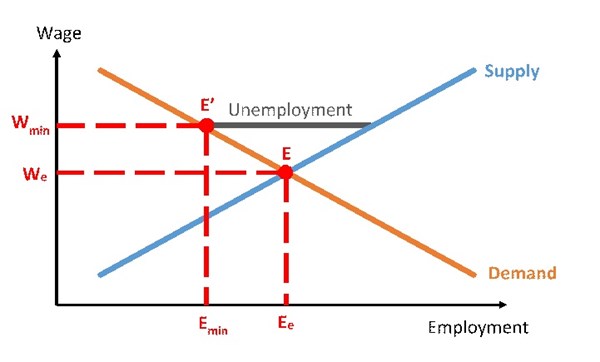Historigraph
Published 7 Nov 2020For unlimited access to the world’s top documentaries and 25% off between 16 Nov and 3 Jan, check out https://curiositystream.thld.co/histo…
Support the channel on Patreon: https://www.patreon.com/historigraph
Buy Historigraph Posters here! teespring.com/stores/historigraph#BattleOfTheFalklandIslands #Historigraph #CuriosityStream
► Twitch: https://www.twitch.tv/addaway
► Twitter: https://twitter.com/historigraph
► Instagram: https://www.instagram.com/historigraph
November 9, 2020
Falklands 1914: Von Spee’s Last Stand
Maine conducts brave and daring experiment with an $18 per hour minimum wage
It’s a bold move, says Jon Miltimore, let’s see if it pays off:
While Florida, which on Tuesday passed a $15 an hour minimum wage referendum, was the only state to have the minimum wage on the ballot in 2020, some localities also voted on the issue.
One of those cities was Portland, the largest city in Maine. The referendum sought to increase the minimum wage from $12 an hour to $15 by 2024. The measure also mandated that workers receive time and a half during a civil emergency (like, say, a pandemic).
Despite opposition from the city’s mayor, seven members of the city council, and dozens of Portland businesses, the measure passed with 60 percent of the vote. That means as early as next month the minimum wage will be $18 an hour, since Maine has declared a civil emergency. (The time-and-a-half will kick in on the $12 minimum wage.)
Businesses already ravaged by stay-at-home orders from the coronavirus have expressed worry about how they will manage to stay in the black.
“In the last 7 months business has dropped from 30 to 50 percent and food costs have skyrocketed. This added increase on a business already depressed due to the pandemic is tough,” one Portland business owner who declined to speak on camera told WCSH, an NBC-affiliate. “We may have to either cut employee hours or cut back on business hours.”
Cutting employee hours is just one of the ways employers negatively respond to laws that artificially raise the price of labor. Other responses include cutting other forms of compensation, such as health care or 401k benefits, replacing workers with robots, and simply assigning employees to do more work.
These are hardly the only unintended consequences. For example, economists David Neumark and William Wascher found that higher minimum wages decrease the number of teens enrolled in high school because they encourage high-skilled teens to drop out; this in turn displaces low-skilled workers.
Tank Chats #84 Leopard PRTL | The Tank Museum
The Tank Museum
Published 6 Sep 2019For TANKFEST 2019, The Tank Museum was extremely lucky to be able to display the Leopard PRTL courtesy of The Historic Collection of the Royal Netherlands Army, in cooperation with the National Military Museum of the Netherlands.
David Willey explores how the self-propelled anti-aircraft system, based on a Leopard 1 tank, works and operates, alongside some footage of the PRTL in action.
Support the work of The Tank Museum on Patreon: ► https://www.patreon.com/tankmuseum
Visit The Tank Museum SHOP: ► https://tankmuseumshop.org/
Twitter: ► https://twitter.com/TankMuseum
Instagram: ► https://www.instagram.com/tankmuseum/
Tiger Tank Blog: ► http://blog.tiger-tank.com/
Tank 100 First World War Centenary Blog: ► http://tank100.com/
#tankmuseum #tanks
QotD: The Children of Men becomes disturbingly real in Japan
To western eyes, contemporary Japan has a kind of earnest childlike wackiness, all karaoke machines and manga cartoons and nuttily sadistic game shows. But, to us demography bores, it’s a sad place that seems to be turning into a theme park of P.D. James’ great dystopian novel The Children Of Men. Baroness James’ tale is set in Britain in the near future, in a world that is infertile: The last newborn babe emerged from the womb in 1995, and since then nothing. It was an unusual subject for the queen of the police procedural, and, indeed, she is the first baroness to write a book about barrenness. The Hollywood director Alfonso Cuarón took the broad theme and made a rather ordinary little film out of it. But the Japanese seem determined to live up to the book’s every telling detail.
In Lady James’ speculative fiction, pets are doted on as child-substitutes, and churches hold christening ceremonies for cats. In contemporary Japanese reality, Tokyo has some 40 “cat cafés” where lonely solitary citizens can while away an afternoon by renting a feline to touch and pet for a couple of companiable hours.
In Lady James’ speculative fiction, all the unneeded toys are burned, except for the dolls, which childless women seize on as the nearest thing to a baby and wheel through the streets. In contemporary Japanese reality, toy makers, their children’s market dwindling, have instead developed dolls for seniors to be the grandchildren they’ll never have: You can dress them up, and put them in a baby carriage, and the computer chip in the back has several dozen phrases of the kind a real grandchild might use to enable them to engage in rudimentary social pleasantries.
P.D. James’ most audacious fancy is that in a barren land sex itself becomes a bit of a chore. The authorities frantically sponsor state porn emporia promoting ever more recherché forms of erotic activity in an effort to reverse the populace’s flagging sexual desire just in case man’s seed should recover its potency. Alas, to no avail. As Lady James writes, “Women complain increasingly of what they describe as painful orgasms: the spasm achieved but not the pleasure. Pages are devoted to this common phenomenon in the women’s magazines.”
As I said, a bold conceit, at least to those who believe that shorn of all those boring procreation hang-ups we can finally be free to indulge our sexual appetites to the full. But it seems the Japanese have embraced the no-sex-please-we’re-dystopian-Brits plot angle, too. In October, Abigail Haworth of The Observer in London filed a story headlined “Why Have Young People in Japan Stopped Having Sex?” Not all young people but a whopping percentage: A survey by the Japan Family Planning Association reported that over a quarter of men aged 16–24 “were not interested in or despised sexual contact.” For women, it was 45 per cent.
Mark Steyn, The [Un]documented Mark Steyn, 2014.





